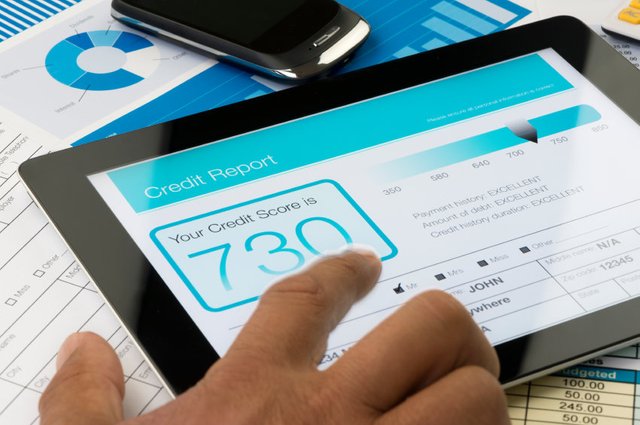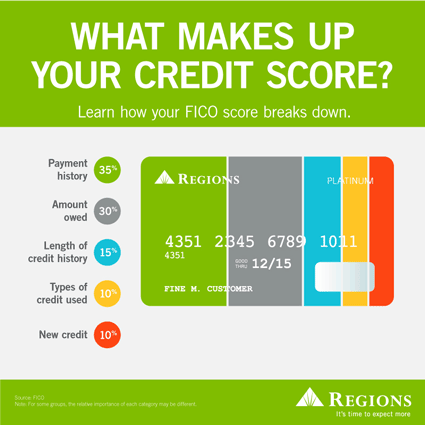3 Easy Steps to Increase your Credit Score and What goes into a Credit Score anyways?
As I dropped my stepson off at school this morning and was driving home, I heard something very interesting on the radio.
It was a Finance expert talking about 3 easy tips that everyone can do to help increase their credit score, and surprisingly these tips can help pretty quickly.
This is what he had to say...
Tip #1.
The first thing you should is start paying your Balance off before the end of the month.
Every month your credit card issuer sends a credit report to the three major Credit Bureaus. Included on this report is your balance at the time of the report. It's possible this report gets sent before you have paid off your balance for the month.
If you get in the habit if running up large balances and then paying them off at the end of the month, you may still be damaging your credit without even realizing it.
The better option would be to pay off your balance several times during the month, especially if it starts to get high.
Tip #2.
The second tip was for people to apply for a larger credit limit. That may sound a bit counter intuitive at first, but the lower the percentage of your available credit you are using each month, the better it looks to creditors.
Once you get above the 30% mark, it starts to work against your credit score.
If you have a good history of paying your balance on time, issuers should be open to the idea of increasing your credit limit. Without changing any of your behaviors, a simple phone call could drastically help your credit score.
Just keep in mind that a request for a credit limit increase could trigger a "hard pull" of your credit report, which may in fact ding your credit score if you don't have a long history. In this instance, ask the card issuer if a hard pull will be triggered, and if it will be ask for a smaller increase. Often a smaller increase forgoes a hard pull.
Tip #3.
Get yourself added as an authorized user on someone else's credit card that has a good credit history. Call up your parents, grandparents, uncle, basically anyone that is in your family that has a good credit history.
Just by getting yourself added as an authorized user to someone with a good credit history, helps show a history of good credit use. Some parents have been recommended to add their children when they are in high school in order to help them establish credit.
Just make sure you are only getting added to someone's card that actually does have a good credit history!

I thought these were some great quick tips that were worth sharing. Hopefully they can help you out some. However, it really got me wondering...
What goes into a credit score exactly anyways?
If we understand how a credit score is calculated perhaps we can better understand how to keep ours in tip top shape. For that I did a little digging and this is what I was able to come up with:
1. Your Payment History - Make sure you are paying your bills on time. This accounts for about 35% of your entire Credit Score.
2. The total amount owed - Make sure you are using less than 30% of all available credit. This accounts for about 30% of your score.
3. Credit History - The longer you are able to show responsible credit use, the better. This accounts for 15% of your score.
4. New Credit - The number of recently opened accounts and credit inquires. This accounts for 10% of your score.
5. Types of Credit - Mortgages, car loans, or credit cards. This accounts for 10% of your score.

Ideally you want a score above 760. Anything north of 760 is considered excellent credit.
As we can see, by far the two biggest credit score determinants are; paying your bills on time, and making sure you don't use more than 30% of all available credit. If you can do those two things you are well on your way to keeping a good credit score!
Stay above 760 my friends!
Sources:
https://blog.mint.com/credit/3-easy-ways-to-improve-your-credit-score0530/
Image Sources:
https://blog.seedly.sg/3-simple-tips-to-help-you-improve-your-credit-score/
https://blog.mint.com/credit/3-easy-ways-to-improve-your-credit-score0530/
Follow me: @jrcornel

Tip #4: earn so much STEEM that you never need to ask for a credit anymore. :)
Haha that is awesome! Well said! :)
;-)
Some tips for folks who are credit ghosts, those who may have messed up their credit in the past and then went credit-free for years, who now have no credit at all. If you're in that odd boat and have been thinking about getting back into the credit game so that you can do responsible adult things, here are some steps to get going.
You've lived on cash/debit card for quite a while now. You've learned to live within your means, the creditors aren't calling anymore, maybe you get the odd letter now and then but you've checked your credit report and it's blank, no history, nothing good, nothing bad. They say having no credit is worse than having bad credit, but I'm not convinced. You're in a pretty decent position as long as you're not trying to buy a house or a new car.
Get a secured credit card. Do your research to see what the best current option is. Capital One offers a secured credit card with a free credit monitoring service that estimates your credit score, and has no yearly fees. There may be better deals out there now but historically they've been a good one. You'll need to deposit cash with them to secure the card, but this will get you moving again. Eventually you can close the account and get your deposit back.
Get a secured loan. Yeah, more upfront cost to eat up your savings account, but if you can do this it'll help a lot. A secured loan is essentially giving the bank your money and then they loan it back to you. Haggle them over the start-up fee, if you have a long standing relationship with the bank they may waive it for you because they'll make their money on the interest. For example, you give them $2,000 and they lock it up then give you $2,000 back which you pay pay back with interest over the term of the loan. This will create a diversity of credit and help your score some more. I recommend that you place the loan money into a separate account that auto-pays the loan back. Towards the end you'll need to pitch in more to make up for the interest you've paid. It's not a cheap way to build credit, you're kind of just buying credit, but it's valuable and will speed up the process. At the end when it's paid off you get your initial cash back and all the positives on your credit history. Do your due diligence and don't commit more cash to it than you can afford to.
After about a year you'll start receiving credit card and loan offers. It's time to begin a transition toward normal credit. Seek out the best deals and only apply when you're confident that you're in good shape. At this point you should only have 2 inquires in the last 2 years, which is good. Only apply for 1 or maybe 2 new cards. You want to keep the number of inquires down but you also need to increase your limits. If you use Amazon a lot then Chase offers a great Amazon Rewards card that pays pretty decently. 5% on all Amazon purchases, 2% at restaurants and gas stations, 1% everywhere else. Depending on your expenses and spending habits you can easily make $25/month back towards Amazon purchases, which is just a nice little bonus to save up over time.
Bonus Tip! If you're used to just living on cash & debit then you know you're responsible and won't get into a jam. Once you've got a credit card you need to use it. Even if you start with a low credit limit keep on using it and pay it off weekly if you have to. The issuer will see that you've been paying it off and should raise your limit over time, though on the secured card they may be a little more stingy. It's also better for you to spend on credit. If your card is stolen and someone charges it up you can fight that much easier so you won't be on the hook for the fraudulent charges. It's much much easier on you to deal with a stolen credit card vs cash or debit card!
Thanks for this info!
Great info.
Wonderful post this is the type of stuff Steemit will excel in once we can find a way to organize all this great content!
All good info... using concepts like these I raised my credit score from low 600s to mid 700s in one years time. Checking CreditKarma every month to keep motivated. No real tricks, just pay the statement balance every month, and once credit score started going up, I opened a few new cards to build overall credit limit that helped me keep total balance well under 30%. New cards all had 0% apr as a bonus for x/months. I did get a slight ding with the hard inquiries, but the effect seemed to go away over a few months time.
Nice! Glad you were able to improve your score!
That credit utilization can hurt your credit score!! I didn't realize it was that high!
Rule of thumb is keep revolving debt utilization to below 30%. Any reported balances utilizing over 30% per tradeline (credit card/revolving loan) will be detrimental to the score in excess of any beneficial report. Additionally, consider the entire Debt-to-Credit ratio (total used revolving credit divided by total available revolving credit) when using the 30% rule.
Very good point!
Good and informative post! I think with post like this we should start educating our children while in their teens about credit. Growing up it was never mentioned around the children in my home.
Yep I agree. There is a part in there about adding high school children as authorized users to their parent's credit card to help them establish and build credit. If done right, that can be very useful and beneficial to the kids!
One other component, average duration of time lines of credit have been open. Keep lines of credit open, don't open new cards and close old ones all the time, this kills your average time.
Good point. There are some other tips as well... this being one of them.
Another tidbit to remember - don't close out accounts once they are paid off. Now of course car loans etc... will close but keep those credit cards and revolving lines of credit OPEN. One of the factors in your credit score is how LONG your credit history is. If your average account age is only a few years - you will have a lower score. If your average account age is longer you will have a higher score. So even if you don't use those older credit cards any longer - keep them open!
Yep! Great points... thanks!
Tip # 2 will likely lower your score, at least initially. That's because it is considered a "Hard Inquiry," which "dings" your credit. Whether or not that is outweighed by the increase in limit (and possible subsequent decrease in Debt-to-Credit Ratio used for revolving debt trade lines) is an important consideration that I urge you to definitely edit the content to disclose this, due to the fact that Tip #2 can be considered misleading without this important point.
Good point. Will add that. Thanks!
Very useful advice. Many thanks. But I've noticed that no matter how good my FICO score(It's 800+)...if my income is too low...I won't get the loan. Catch 22. Can't get a home loan. I'm stuck renting until I create more income. I started from a secured credit card and then qualified for an unsecured credit card after 2 years. And having a long term checking account is a major plus. I was denied an unsecured credit card at every other bank that I didn't have a savings/checking account. Only US Bank(banked with them for over 10 years) offered me an amazing limit and interest rate(12% per annum). And also, if you have derogatory credit...if it's over 2 years old...it's not a deal breaker. Good luck!